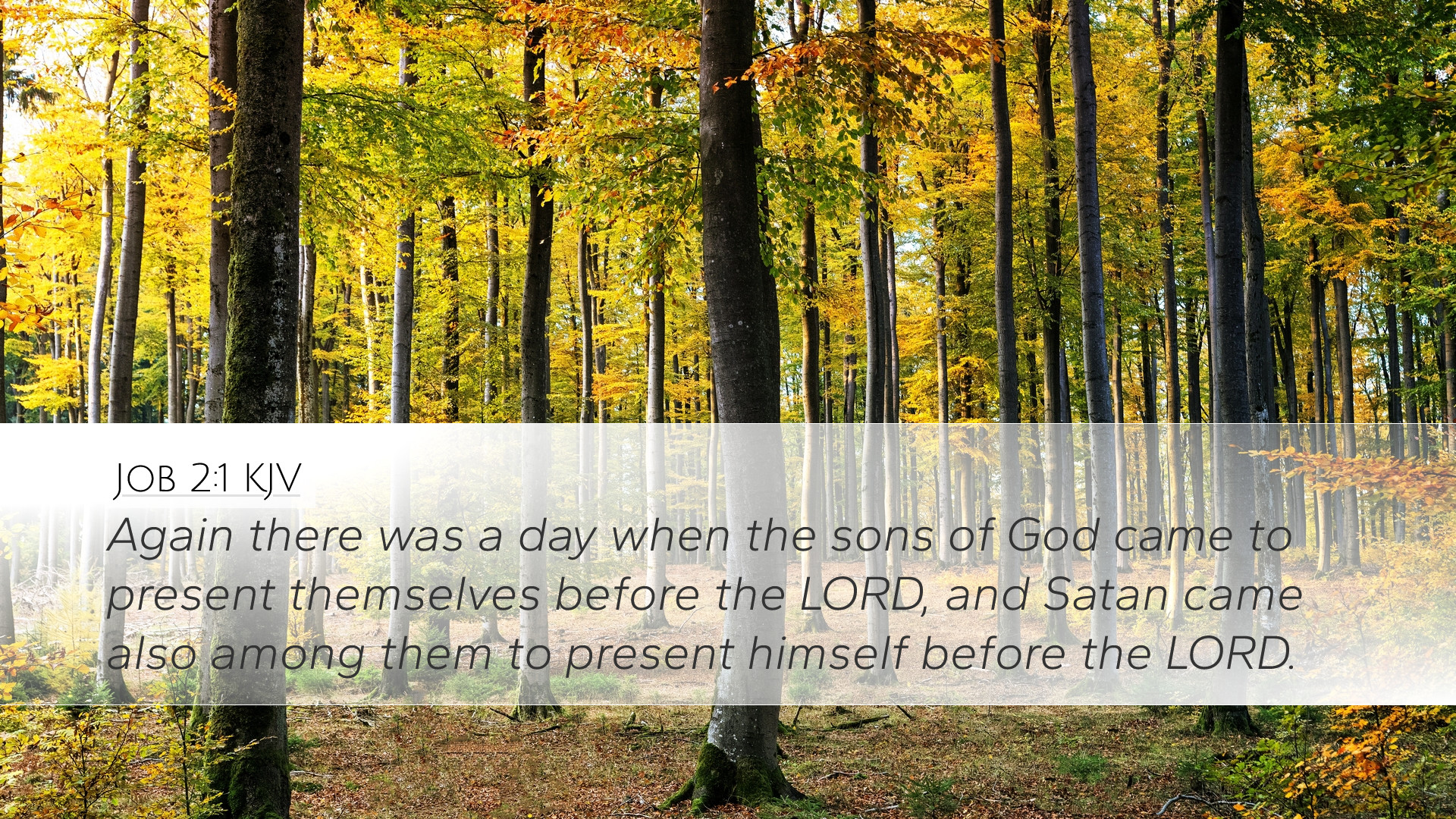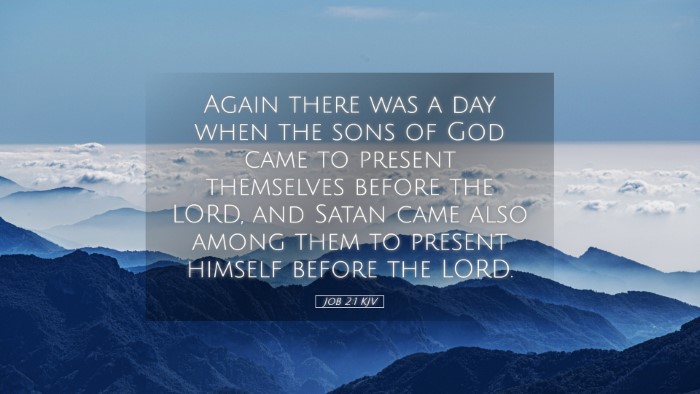Old Testament
Genesis Exodus Leviticus Numbers Deuteronomy Joshua Judges Ruth 1 Samuel 2 Samuel 1 Kings 2 Kings 1 Chronicles 2 Chronicles Ezra Nehemiah Esther Job Psalms Proverbs Ecclesiastes Song of Solomon Isaiah Jeremiah Lamentations Ezekiel Daniel Hosea Joel Amos Obadiah Jonah Micah Nahum Habakkuk Zephaniah Haggai Zechariah MalachiJob 2:1
Job 2:1 KJV
Again there was a day when the sons of God came to present themselves before the LORD, and Satan came also among them to present himself before the LORD.
Job 2:1 Bible Commentary
Commentary on Job 2:1
In Job 2:1, we find a profound and theological exploration of the nature of suffering, the integrity of faith, and the cosmic drama between good and evil. This verse introduces us to a second heavenly assembly where the sons of God present themselves before the Lord, and Satan once again joins them. Understanding this verse requires diving deeply into its implications, which have been discussed by various scholars and commentators throughout history.
Text of Job 2:1 (KJV)
“Again there was a day when the sons of God came to present themselves before the Lord, and Satan came also among them to present himself before the Lord.”
Contextual Overview
This verse takes place after Job's initial trials, where he loses his wealth, his children, and suffers greatly. The heavenly scene is crucial as it sets up the ongoing dialogue between God and Satan, which serves as a backdrop for the human afflictions experienced by Job. Understanding the spiritual warfare at play is essential for grasping the complexities within this narrative.
Insights from Public Domain Commentaries
Matthew Henry's Commentary
Matthew Henry emphasizes the recurring nature of the heavenly court. He points out that this 'day' indicates a specific time when God governs the world, reminding us of His sovereignty. Henry notes that Satan’s presence among the sons of God highlights the mysterious allowance of evil in the world. He further suggests that this scene illustrates the concept of continual spiritual conflict.
Albert Barnes' Notes
Albert Barnes provides insight into the character of Satan. He highlights that Satan is not merely a tempter but a prosecutor who seeks to bring accusations against God's faithful. Barnes interprets the phrase "present themselves" as an act of accountability, suggesting that even Satan, in his rebellion, must acknowledge God’s authority. This sets a tone that underscores God’s control and the boundaries He places upon evil.
Adam Clarke's Commentary
Adam Clarke considers the cosmic implications of the verse, noting the universality of the gatherings of the “sons of God.” He proposes that this assembly can be seen as a representation of a larger spiritual reality, where all celestial beings must account for their actions before God. Clarke also reflects upon the theological aspects of Satan's access to God's presence, contemplating what this means for the nature of evil entities in relation to divine authority.
Theological Themes
- The Sovereignty of God: The verse reaffirms that God is sovereign over all creation—including evil. Despite the adversary's presence, it is God who controls the dialogue, illustrating His ultimate authority.
- The Nature of Suffering: Job's condition serves as a case study for exploring the purpose of suffering within the broader theological framework. It challenges the simplistic notions of retribution theology common in Job's time.
- Intercession and Accusation: The roles of the 'sons of God' as intercessors contrast sharply with Satan’s role as the accuser. This sets a critical tone for understanding mercy and judgment.
- The Reality of Spiritual Warfare: This verse highlights that human suffering is often part of a larger cosmic battle. Job becomes a symbol of steadfast faith amidst these assaults.
Practical Applications
The study of Job 2:1 allows for rich reflection among pastors and theologians. Here are some practical applications to consider:
- Understanding Suffering: Encourage biblical counseling that recognizes suffering as a complex issue within the divine plan, rather than merely a punishment for sin.
- Faith Under Trial: Job exemplifies unwavering faith in the midst of trials. Pastoral care should empower congregants to trust in God's sovereignty even when His plans are not understood.
- Community Accountability: Just as the sons of God present themselves, church leaders should be mindful of accountability in their ministries and the importance of communal worship and prayer.
- Teach About Spiritual Warfare: Sermons and teachings should address the reality of spiritual warfare, equipping believers to stand firm against accusations and temptations.
Conclusion
Job 2:1 provides a crucial glimpse into the relationship between God, humanity, and the forces of evil. While there remain many questions, the insights of Henry, Barnes, and Clarke guide us in understanding the gravity of our faith amidst suffering. The cosmic backdrop reveals a God who is actively involved in the affairs of humanity and who presides over the heavenly courtroom with justice, mercy, and sovereignty.


